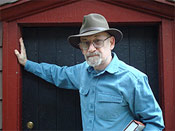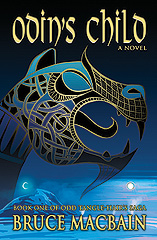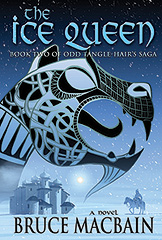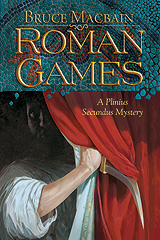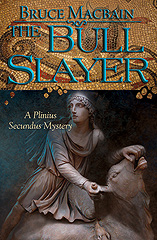In Odin’s Child (Chapter 13) young Odd Tangle-Hair and his friend Kalf
Slender-Leg leave Iceland to go a-viking with a rag-tag crew in a stolen ship.
Odd has lain hidden for many weeks in the house of Kalf’s grandfather, Hoskuld
Long-Jaws. The half-blind old man is loath to let his grandson go on this mad
adventure with Odd but Kalf insists: it is time for him to become a man.
Finally, as he and Odd are on the point of leaving, Hoskuld relents, but
lectures the boys on the ways of the wide world.
Kalf
went to embrace him, but Hoskuld held him at arm's length and bent his brows
sternly.
"Now
Kalf, you must promise me. Stay
with Odd. Never leave his side.
And mind this too, damn it all. I am not a lecturing sort of man, but there are
wise words in shriveled skins, and young dogs ought to heed ’em. You listen,
too Odd. Keep silent in a strange hall. Answer lying with lies. And don't think
that everyone who laughs when you do is your friend. When the ale goes round,
drink your share, but don't hold on to the cup. Above all, never trust what a
woman tells you or believe 'em constant, for their heads are turned on a
potter's wheel and their counsels are cold. It takes sharp wits to wander in
the world, you young dogs, and a fool is soon found out."
"Yes,
Grandfather, yes," Slender-Leg answered impatiently to all this preachy
stuff.
Hoskuld’s lecture is inspired by
a collection of verses called the Havamal,
or The Sayings of the High One. The ‘High
One’ of the title is Odin All-Father, god of poetry, warfare, and magic. In one
hundred and sixty-four short poetic stanzas Odin distills the wisdom of Viking
Age Scandinavia. The Havamal is just
one part of a larger work, the Poetic Edda,
which contains most of what we know of Sigurd and Brunhilde and all those other
legendary heroes who found their way eventually into Richard Wagner’s operas. From
such a source, then, one might expect bravado and boasting, incitement to
bloodshed and heroic sacrifice. On the
contrary, the Havamal urges caution,
moderation, common sense, and the virtues of friendship.
 |
| A page of the single surviving manuscript of the Poetic Edda (ca. 1270)
Here is a random dozen verses,
adapted from the translation by Carolyne Larrington (if you follow me on Twitter you’ll see
a new one posted every week or so.)
So, if what you want is guidance to a quiet, peaceful, and
contented life…ask a Viking!
|
Saturday, July 4, 2015
Need advice? Ask a Viking
Subscribe to:
Posts (Atom)

